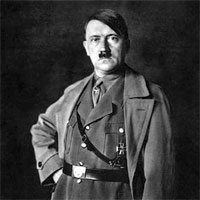Adolf Hitler

- Position: Fuhrer/Reich Chancellor of Germany
- Awards and Decorations: Iron Cross (first and second class)
Adolf Hitler was born in Braunau-am-Inn, Austria on April 20, 1889 to Alois and Klara Hitler. By the age of 19 both of Hitler's parents had died, after which he moved to Germany and joined the German army. He fought in World War I and rose to the rank of obergefreiter (corporal).
Hitler became involved with what would later be called the National Socialist German Workers Party in 1919. This organization would become known as the Nazi party, which under Hitler's leadership adopted the swastika logo in the summer of 1920. No longer a member of the German Army, Hitler began his rise to power. He was arrested in 1923 for treason against the German government, but spent only six months in jail, during which he wrote "Mein Kampf."
Although the Nazi party was weak at this time, and had been banned, Hitler continued his efforts. An effective speaker, Hitler used the weak world economy to speak directly to the German people, who were particularly hard hit by poor economics. Hitler himself did not become a German citizen until 1932, after which he made a failed bid to become Germany's chancellor. The Nazi party continued to gain political power, and in 1933 Hitler was appointed to the position of Chancellor of Germany.
In early 1933 Hitler gained dictorial powers over the Reichstag, and by July of the same year the Nazi party was declared the only legal political party in Germany. In 1934, following the death of President Hindenberg, the positions of chancellor and president were merged, and Hitler was firmly in control of Germany. At this time he was known as Fuhrer and Reich Chancellor.
Hitler quickly began increasing the size of Germany's armed forces, although significant limitations had been placed on Germany following its defeat in World War I. The nations of the world did nothing to prevent Germany's military expansion, in spite of its blatant treaty violations.
In 1938 Germany annexed Austria and parts of Czechoslovakia. In 1939 Poland was invaded, which finally forced Britain and France to declare war on Germany, thus starting the second World War. In 1940 Germany advanced on Denmark, Norway, the Netherlands, Belgium and France. In 1941 the Soviet Union was attacked.
Hitler's role in the defeat of German forces on D-Day and beyond was significant. His desire to prevent an Allied attack led to the construction of the impressive, yet thin and easily breachable, Atlantic Wall, and his orders to his officers in the field, who were told to defend ground at all costs, prevented the German Army from using its maneuvering strength to launch counterattacks. After the D-Day landings on June 6, 1944, Hitler waited too long in ordering forces in the Pas-de-Calais area to move to Normandy. Although Hitler was one of the few who believed that Normandy was a viable landing spot for the Allies, he was ultimately convinced that the invasion would take place at Pas-de-Calais.
Adolf Hitler died on April 30, 1945 in an underground bunker in Berlin. He and his new wife, Eva Braun, committed suicide.
Private Jackson makes a reference to Hitler when bragging about his sniping abilities. According to Jackson, the war would have been over if he could have gotten within one mile of Hitler with a clear line of sight.
